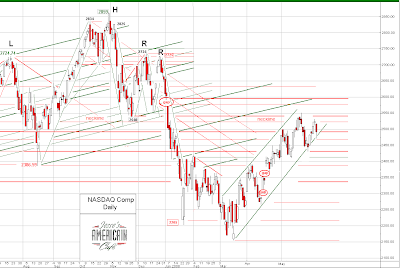 Moody's and Standard & Poor's are moving slowly on these downgrades because these companies extend the 'umbrella' of their rating to large portions of the debt markets, including municipal bonds as well as Collateralized Debt Obligations (CDO) packages.
Moody's and Standard & Poor's are moving slowly on these downgrades because these companies extend the 'umbrella' of their rating to large portions of the debt markets, including municipal bonds as well as Collateralized Debt Obligations (CDO) packages.
A downgrade of the monoline could have a domino effect on debt packages held as assets by the Wall Street Banks, pension funds, insurance companies and the Federal Reserve as backing for the US dollar in circulation.
Of course we all know that ABK and MBI are not AAA and are headed towards insolvency and probable acquisition for a nominal amount or bankruptcy, but we pretend they are still viable and the highest rated debt in the country.
Moody's says it may cut Aaa ratings of Ambac, MBIA
Bond insurers' shares slump to record lows after ratings agency warning
By Alistair Barr, MarketWatch
Last update: 4:41 p.m. EDT June 4, 2008
SAN FRANCISCO (MarketWatch) -- Moody's Investors Service said Wednesday that it may downgrade the Aaa ratings of Ambac Financial and MBIA Inc. because the bond insurers are being hit harder than expected by the mortgage-fueled credit crunch.
MBIA shares slumped 16% to close at $5.63 after the ratings agency's warning. Ambac dropped 17% to $2.49. Both stocks hit record lows.
"They have no future," said Sean Egan, chief ratings officer at Egan-Jones Ratings, a rating agency that's paid by investors rather than issuers. "They will argue otherwise but as a practical matter they don't have a future." Egan-Jones has non-investment grade, or junk, ratings on MBIA and Ambac and began downgrading the bond insurers a year and a half ago, he noted.
Egan-Jones has non-investment grade, or junk, ratings on MBIA and Ambac and began downgrading the bond insurers a year and a half ago, he noted.
Bond insurers rely on their top ratings to sell guarantees on various types of debt, including municipal bonds, corporate bonds, mortgage-backed securities and collateralized debt obligations, or CDOs. But the mortgage meltdown and falling house prices have hit them hard, putting those top ratings in jeopardy.
The market lost confidence in the official triple-A ratings of MBIA and Ambac several months ago, making it virtually impossible for the companies to sell new guarantees. Without new business, they are essentially already in "run-off," where insurers stop selling policies and allow their existing book of business to mature and expire, Egan explained.
"It was going to be very difficult anyway, but Moody's announcement today makes it even more difficult for these companies to climb back," he added.
MBIA and Ambac raised billions of dollars in new capital earlier this year to protect their top ratings. But their shares and debt securities are now trading at such depressed levels that it would be very difficult to raise more money now, Egan and others said.
Most likely Aa have weak new business prospects, little financial flexibility and may suffer higher losses on guarantees they sold on mortgage-related securities, Moody's said in a statement.
The agency put the Aaa ratings of MBIA's main bond insurance unit -- MBIA Insurance Corp. -- on review for a possible downgrade. The most likely outcome of the review will be a downgrade to the Aa range. But Moody's also warned that it could cut MBIA to single A.
"We would view the loss of this rating as a significant detriment to MBIA's ability to write new business and raise additional capital," Catherine Seifert, an insurance analyst at Standard & Poor's Equity Research, wrote in a note to clients. "This move, if it comes to fruition, may escalate the downward spiral already underway in MBIA's shares." Moody's also put the Aaa ratings of Ambac's main bond insurance subsidiary on review for a possible downgrade. The most likely outcome of this review will be a cut to the Aa range, the agency said.
Moody's also put the Aaa ratings of Ambac's main bond insurance subsidiary on review for a possible downgrade. The most likely outcome of this review will be a cut to the Aa range, the agency said.
MBIA said it disagreed with Moody's decision and argued that there haven't been any material changes in the company's operating environment that would warrant a downgrade.
"We are surprised by both the timing and direction of this action and can only conclude that the requirements for a Triple-A rating continue to change," said Jay Brown, chairman and CEO of MBIA, in a statement.
The bond insurer raised new capital earlier this year and was planning to funnel $900 million of that from its holding company into its bond insurance subsidiary MBIA Insurance Corp. But the company said on Wednesday that it won't do that now because the original plan was designed to support the unit's triple-A rating.
Jack Dorer, a managing director at Moody's, said MBIA's decision to keep the $900 million at its holding company will be taken into account when deciding whether to downgrade the bond insurance unit.
"In terms of the claims-paying ability of the operating company it is certainly better to have money in the operating company than not," he explained in an interview.
Ambac won't raise new capital
Ambac said it was "disappointed" by Moody's decision, stressing that it's raised $1.5 billion in new capital since March and expects to generate a new capital cushion of $500 million by the end of the second quarter.
The bond insurer also said it's not planning to raise any more new capital.
"The Board and management continue to explore all strategic alternatives and remain confident of the strong business value embedded within our enterprise," the company added in a statement.
Alistair Barr is a reporter for MarketWatch in San Francisco.







































